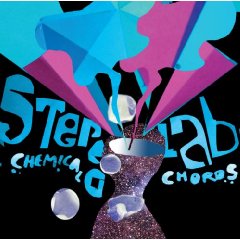It’s strange to remember how fresh a breath of air the post-rock of bands like Tortoise and, in the UK, Stereolab seemed in the early 1990s. Alternative rock was the same old territory of emotional catharsis through volume (just like 1970s rock before it, actually, as grunge artists themselves were only to happy to explain, although this was somewhat ignored in the rush to embrace the New). With the benefit of hindsight, grunge now appears like a regression, a perpetuation of the infantilism of rock: have a good cry, let those emotions out.
Stereolab certainly embraced the past too, taking wholesale the propulsive motorik beat of Neu! in their early work. For them, though, this was a lost blueprint, a future-rock never properly adopted at the time, where an endless play of textures and layers would wipe clean the mass and volume that had accumulated over the years (besides, someone had to take up the challenge that Neu! laid down). A track like ‘Jenny Ondioline’, which reworks a single, beautifully blank riff in three completely different settings, suggested that if rock had a future at all, it was simply as raw material for a radically remixed version of the form.
Detachment became self-defeating after a time, though. Stereolab’s use of breezy French Pop, library music and soundtracks eventually, a decade after their early xenith, began to feel like elements of an immaculate record collection endlessly rearranged and relayered. And this is what makes new album Chemical Chords compelling ‐ rather than the endlessly filtered product of Tim Gane and Laetitia Sadier’s musical imaginations, it’s dry and concise, three minute songs recorded in what sounds like an airtight studio. For the first time in a while, the group feels present, in both the chronological sense and in terms of feeling really-there. There’s virtually no reverb. The melodies are primary coloured, simple, decisive tonics and codas. At times, they could almost ‐ almost ‐ be a cannier, more intellectual relation of Alphabeat. Indeed, Sadier’s vocals are unusually sun kissed, drifting off into pure haze in the higher registers.
There are no stunningly good songs on Chemical Chords, yet it’s always much more than the some of its (very simple) parts. Like Brian Wilson, the melodies always seem to ascend, no matter how simple they are. There are very few choruses ‐ the best parts of all songs, anyway, is when they’re going upward, not when they’re at their xenith ‐ instead, it’s just verses endlessly wending their way heavenwards. ‘Neon Beanbag’ is typical Stereolab style French flavoured pop, but with intensely-studied melodic moves and a gathering momentum. The title track has soundtrack pretensions, but the guitar and harpsichord are so crisp it’s as if they’re playing next to your ear.
Throughout, the feeling of Chemical Chords is of how stark it is. No tricks, just the group in a studio searching for ways to create space and interplay within their music. The drums, sometimes played by Tim Gane himself, are crisp matrices for instruments to intertwine around. It’s not a return to Stereolab’s rock-is-dead radicalism, yet there’s a renewed sense of getting to grips with the nuts and bolts of the machine. No detachment, no layers, but a crisp sense that the band has suddenly snapped into focus. Music this fresh feels like it washes your brain clean, and in a sense, Stereolab’s mission to cleanse rock of its dead weight is suddenly back on.


